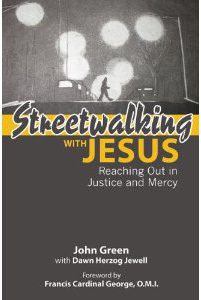 Two weeks ago, I picked up a magazine off our parish’s literature rack and thumbed through it. Halfway through, I saw an article about Emmaus Ministries (www.streets.org), a Chicago-based outreach that ministers to male prostitutes who work the streets. I was intrigued, so I went online and read up on the ministry and even purchased the book, Streetwalking with Jesus: Reaching Out in Justice and Mercy by the group’s founder, John Green, a Catholic deacon who now lives in Ohio with his wife and children.
Two weeks ago, I picked up a magazine off our parish’s literature rack and thumbed through it. Halfway through, I saw an article about Emmaus Ministries (www.streets.org), a Chicago-based outreach that ministers to male prostitutes who work the streets. I was intrigued, so I went online and read up on the ministry and even purchased the book, Streetwalking with Jesus: Reaching Out in Justice and Mercy by the group’s founder, John Green, a Catholic deacon who now lives in Ohio with his wife and children.
The 200-page book arrived about four days ago and I’m already done. This is no small feat for a homeschooling mother of five kids, including a toddler! What makes Green’s book so compelling is that in sharing the heartrending and inspiring stories of the men prostituting themselves on the streets (who sometimes recover), he ends each chapter with a series of questions that will challenge you to go deeper in your love of God and neighbor.
And boy do those questions rake across your soul. In the very first chapter, Green tells the story of Jim, a prostitute who was charged (and acquitted) of murdering his “sugar daddy”–the older man who offered him shelter, safety, and financial resources in return for sexual favors. Green asks if it’s difficult for us to see someone like Jim “clothed with glory and honor.” Fair enough. But then he asks, “What about the sugar daddy?”
I realized that while Jim’s life story only engendered compassion in me–he was born with fetal alcohol syndrome and beaten by his mother’s boyfriend until he was brain damaged–I found it far harder to feel anything but loathing toward the older, wealthy man who had preyed upon him. Yet as Green points out, relationships between young prostitutes and their sugar daddies “often entail real needs that the two men are trying to meet. The sugar daddy has a nurturing, parental need to give; the hustler craves to be loved.” I wanted to relegate to the older man to the role of “disgusting predator” and dismiss him, but in truth he is just as broken and spiritually impoverished as the prostitute he manipulates.
It reminded me of Corrie and Betsy Ten Boom. While in a concentration camp during World War II, the sisters witnessed a guard savagely beating a young woman. Corrie said, “How terrible!” Betsy said, “I know! We have to show her that love is the better way.” Unlike Corrie, Betsy considered the person exhibiting the lack of love as an even greater victim than the person being abused.
What an incredible thing, to be able to see both the victim and his abuser as a wounded, yet still loved child of God, as Green and the Emmaus staff does. I know I am rarely capable of this. What about you?
To educate people about the suffering and struggles of male prostitutes, Emmaus has a one-hour dramatic presentation that brings the stories of the men to life. The production can be performed at parishes, for groups, or for charitable organizations…anyone who needs help seeing the inherent dignity of these “lost sons” of God.
 On both the Emmaus website and in the book, these Christians challenge the rest of us to let go of our “learned blindness.” That’s the comfortable life that enables us to remain separated–physically and spiritually–from the poor and poor in spirit. Green says, “The degree to which I am blessed staggers me. The degree to which I take that for granted shames me.” He describes spending a weekend camping with three male prostitutes outside the city, then returning home and dropping them off at “the spot”–a smattering of cardboard boxes sitting over a steam grate where the men lived, if you can call that living. Green went home, got into his comfortable bed in his warm apartment, and wept for the suffering of his brothers.
On both the Emmaus website and in the book, these Christians challenge the rest of us to let go of our “learned blindness.” That’s the comfortable life that enables us to remain separated–physically and spiritually–from the poor and poor in spirit. Green says, “The degree to which I am blessed staggers me. The degree to which I take that for granted shames me.” He describes spending a weekend camping with three male prostitutes outside the city, then returning home and dropping them off at “the spot”–a smattering of cardboard boxes sitting over a steam grate where the men lived, if you can call that living. Green went home, got into his comfortable bed in his warm apartment, and wept for the suffering of his brothers.
How often do we remember to thank God humbly for our many blessings? And as importantly, are we willing to sacrifice some of those blessings to alleviate the suffering of those in need?
If we have anything, Green says–material comfort or intellectual talents or spiritual clarity–every bit of it is a gift from God. A gift given for one purpose–to serve others in love. It’s clear that this is a ministry that doesn’t reach out to those on the streets through self-righteousness or Pharisaic condescension, but through a sincere and humble love of their brothers. This is the kind of love we’re called to offer every person we meet–gay or straight, rich or poor, law-abiding or criminal, young or old.
May God help us to love Him better by loving others better. “Whatever you do for the least of these, you do for Me.”
